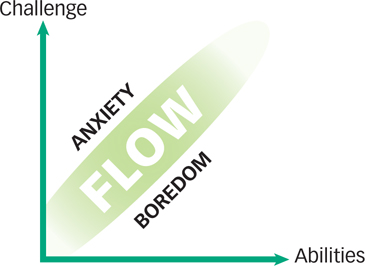11.4 The Humanistic–Existential Approach: Personality as Choice
In the 1950s and 1960s, psychologists began to try to understand personality from a very different viewpoint. Humanistic and existential theorists turned their attention to how humans make healthy choices that create their personalities. Humanistic psychologists emphasized a positive, optimistic view of human nature that highlights people’s inherent goodness and their potential for personal growth. Existential psychologists focused on the individual as a responsible agent who is free to create and live his or her life while negotiating the issue of meaning and the reality of death. The humanistic–
Human Needs and Self-Actualization
Humanists see the self-actualizing tendency, the human motive toward realizing our inner potential, as a major factor in personality. The pursuit of knowledge, the expression of one’s creativity, the quest for spiritual enlightenment, and the desire to give to society are all examples of self-
self-actualizing tendency
The human motive toward realizing our inner potential.
364
What is it to be self-
Humanist psychologists explain individual personality differences as arising from the various ways that the environment facilitates—
It feels great to be doing exactly what you are capable of doing. Mihaly Csikszentmihalyi (1990) found that engagement in tasks that exactly match one’s abilities creates a mental state of energized focus that he called flow (see FIGURE 11.4). Tasks that are below our abilities cause boredom, those that are too challenging cause anxiety, and those that are “just right” lead to the experience of flow. If you know how to play the piano, for example, and are playing a Chopin prelude that you know well enough that it just matches your abilities, you are likely to experience this optimal state. People report being happier at these times than at any other times. Humanists believe that such peak experiences, or states of flow, reflect the realization of one’s human potential and represent the height of personality development.

Personality as Existence

Existentialists agree with humanists about many of the features of personality but focus on challenges to the human condition that are more profound than the lack of a nurturing environment. For existentialists, specific aspects of the human condition, such as awareness of our own existence and the ability to make choices about how to behave, have a double-
existential approach
A school of thought that regards personality as governed by an individual’s ongoing choices and decisions in the context of the realities of life and death.
According to the existential perspective, the difficulties we face in finding meaning in life and in accepting the responsibility of making free choices provoke a type of anxiety existentialists call angst (the anxiety of fully being). The human ability to consider limitless numbers of goals and actions is exhilarating, but it can also open the door to profound questions such as: Why am I here? What is the meaning of my life?
Thinking about the meaning of existence also can evoke an awareness of the inevitability of death. What, then, is the purpose of living if life as we know it will end one day? Alternatively, does life have more meaning given that it is so temporary? Existential theorists do not suggest that people consider these profound existential issues on a day-
365
What is angst, and how is it created?
For existentialists, a healthier solution is to face the issues head-
SUMMARY QUIZ [11.4]
Question 11.10
| 1. | Humanists see personality as directed toward the goal of |
- existentialism.
- self-
actualization. - healthy adult sexuality.
- sublimation.
b.
Question 11.11
| 2. | According to the existential perspective, the difficulties we face in finding meaning in life and in accepting the responsibility for making free choices provoke a type of anxiety called |
- angst.
- flow.
- the self-
actualizing tendency. - mortality salience.
a.